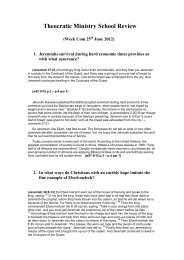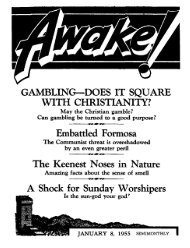1964 Awake! - Theocratic Collector.com
1964 Awake! - Theocratic Collector.com
1964 Awake! - Theocratic Collector.com
You also want an ePaper? Increase the reach of your titles
YUMPU automatically turns print PDFs into web optimized ePapers that Google loves.
irth of their people to nationhood will be<br />
successful. As a means to tbat end they<br />
have devised a strong constitution. Based<br />
to a. large extent on the American constitution,<br />
it provides for a strong executive<br />
presided over by the president, who is both<br />
head of state and <strong>com</strong>mander-in-chief of<br />
the armed forces.<br />
Enshrined in the constitution are powerful<br />
guarantees of the rights of the individual.<br />
The first seC'tion states: "Whereas<br />
eVery person in [Zambia] is entitled to<br />
the fundamental rights and freedoms of<br />
the individual, that is to say, the right,<br />
whatever his race, place of origin, political<br />
opinions, colour, creed, or sex, but subject<br />
to respect for the rights and freedoms of<br />
others and for the public interest to each<br />
and all of the following, namely-<br />
"(a) life, liberty, security of the person<br />
and the protection of the law;<br />
"(b) freedom of conscience, of expression<br />
and of assembly and association;<br />
and<br />
"(c) protection for the privacy of his<br />
home and other property and<br />
from deprivation of property<br />
without <strong>com</strong>pensation."<br />
The constitution then goes on to elaborate<br />
on the protection of these fundamental<br />
rights and freedoms. For example, section<br />
nine states: "Except with his own<br />
consent, no person shall be hindered in<br />
the enjoyment of his freedom of conscience,<br />
and for the purposes of this section<br />
the said freedom includes freedom of<br />
thought and religion, ... and freedom, either<br />
alone or in <strong>com</strong>munity with others,<br />
and both in public and in private, to manifest<br />
and propagate his religion or belief in<br />
WOI'$hip, teaching, practice and observance<br />
.... No person attending any place<br />
of education shall be required to receive<br />
religious instruction or to take part in or<br />
attend any religious ceremony or obser·<br />
vance if that instruction, ceremony or observance<br />
relates to a religion other than<br />
his own."<br />
Constitution Put to the Test<br />
Naturally such a constitution could not<br />
provide protection for persons claiming<br />
the practice of religion and yet conductJng<br />
themselves in a way that Was without any<br />
respect for law and order and that endangered<br />
the lives of others. Thus, when, in<br />
the month of July, <strong>1964</strong>, the adherents of<br />
the Lumpa church, followers of the selfstyled<br />
prophetess Lenshina, went on the<br />
rampage, killing innocent people and ambushing<br />
police who went to try to restore<br />
order, they put themselves outside the<br />
freedoms guaranteed by the Zambia constitution,<br />
even though they claimed their<br />
actions were provoked by political persecution<br />
due to their refusal to vote in the<br />
elections.<br />
In strikjng contrast has been the conduct<br />
of Jehovah's witnesses in Zambia over<br />
the past year or two. Though under much<br />
provocation at times because of attacks on<br />
their persons, private property and Kingdom<br />
Halls (many of which were burned)<br />
by prejudiced persons acting outside the<br />
law, they have not retaliated, they have<br />
not violently returned evil for evil Even<br />
when an attempt was made to restrict<br />
their Christian activity by local bans they<br />
did not act illegally. Rather, by acting law·<br />
fully in appealing against such unjust<br />
treatment, they were able not only to vindicate<br />
the propriety of their Christian ministry,<br />
but also to provide for an opportunity<br />
to test the worth of the constitution<br />
in defense of a religious minority.<br />
On February 15, <strong>1964</strong>, the Lunda Native<br />
Authority in the northern province<br />
of the country formulated an order entitled<br />
"The Lunda Native Authority Door<br />
to Door Canvassing Order." It stated in<br />
part that "no person shall canvass reli-<br />
AWAKE I




